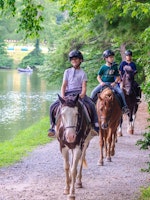Guided by Honesty

At camp, honesty shows up in a thousand small ways. It’s in the trust we place in each other, the way we take responsibility during a game, and how we treat each other’s belongings.

This week, we focused on three parts of honesty:
- Act with integrity
- Take responsibility for your actions
- Tell the truth
Camper Definitions
My dad. He is an honest guy.
Ford M.- Charleston, SC
Whenever you think about lying, you should be honest. It’s never as bad as you think it is going to be.
Lacklan L.- Atlanta, GA
When you’re honest, people want to be around you.
Thomas T. -Chattanooga, TN



Honesty in Action
A few campers brought up The Boy Who Cried Wolf as a cautionary tale. Others connected honesty directly to camp activities:
- Disc Golf – “Everyone in your group has to trust you where you go and when you pick up your disc.”
- Ultimate Frisbee – “You can only take so many steps before you lose the disc. If you argue the whole time about steps, people don’t want to play or have you on their team.”
- Pickleball – “You have to call your own lines. If you aren’t honest, you lose trust. It slows the game down and causes tons of arguments. I learned that lesson this week!”
Heather Moffitt, Archery activity counselor, sees honesty woven into the heart of her activity as well.
Archery is a great metaphor for honesty. You’re either on the mark or off. The arrow doesn’t lie. You don’t want to spend your life like a bent arrow.
Heather Moffitt, Archery Counselor, Mars Hill, NC



The Outdoor Adventure Perspective
Will Wilson, our Outdoor Adventure Director, sees honesty as essential for every trip into the woods, onto the water, or up a mountain. In adventure programs, campers and counselors follow what’s called expedition behavior—the idea that everyone on the trip must be able to trust their life to the people around them.
That trust only works if people are honest—about their gear, their abilities, and their behavior.
If someone is struggling, or if they can’t do something, or forgot a piece of gear back in camp, it weakens everybody. Honesty is a big expectation for these trips. All parts of our code are reflected in every part of camp—from all-camp games to our trips. Society gets better when a Falling Creek Boy goes home because he may think, ‘What would my counselor say if he saw me doing this?’
Will Wilson, Outdoor Adventure Director




Why It Matters at Camp
Honesty makes camp possible. It lets games run smoothly. It builds trust in cabins. It keeps friendships strong. And the more we practice it here, the easier it becomes to carry it home.
“Behold, how good and how pleasant it is for brothers to dwell together in unity.” – Psalm 133:1